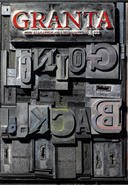 The newest issue of Granta (111) is themed “Going Back” and features an excerpt from Mark Twain’s never before published and forthcoming autobiography. Twain himself barred anyone from publishing the text until 100 years after his death. This fall, the University of California will release Volume 1 of Twain’s text. “The Farm” is available to read in the issue, and online at Granta, Benjamin Griffin writes on editing the autobiography (A Voice from the Vault) and Malcolm Jones offers his commentary, “Where do we put Mark Twain?” – on trying to place a literary great. Several other links to Twain-related sites and projects are also included, as well as images from Twain’s original text.
The newest issue of Granta (111) is themed “Going Back” and features an excerpt from Mark Twain’s never before published and forthcoming autobiography. Twain himself barred anyone from publishing the text until 100 years after his death. This fall, the University of California will release Volume 1 of Twain’s text. “The Farm” is available to read in the issue, and online at Granta, Benjamin Griffin writes on editing the autobiography (A Voice from the Vault) and Malcolm Jones offers his commentary, “Where do we put Mark Twain?” – on trying to place a literary great. Several other links to Twain-related sites and projects are also included, as well as images from Twain’s original text.
NewPages Blog
At the NewPages Blog readers and writers can catch up with their favorite literary and alternative magazines, independent and university presses, creative writing programs, and writing and literary events. Find new books, new issue announcements, contest winners, and so much more!
Writers Houses
Newly launched labor of love by A. N. Devers, The Writers’ Houses database is designed to be a field guide to deceased writers’ homes, searchable by author, city, state, and country. TWH hopes “to document all writers’ houses open to the public in the world.” Ambitious, and in need of help from writers and editors who can contribute to the blog and field guide. THANK YOU A.N. Devers!
Additionally, there are limited edition screenprint art posters of several writers’ houses available through M + E.
Spread the word!
New Lit on the Block :: Tidal Basin Review
New online, the Tidal Basin Review editorial team includes: Tori Arthur, Fiction & Non-Fiction Editor; Marlene Hawthrone-Thomas, Photography Editor; Fred Joiner, Poetry Editor; Truth Thomas, Poetry Editor; Melanie Henderson, Managing Editor, Randall Horton, Editor-in-Chief.
The mission of TBR is “to provide a space for inclusive and interdisciplinary approaches to the creative arts. We expressively and fiscally support artists who represent the rich American landscape by publishing high-quality, well-crafted literature, visual and media art through our annual contest, readings, and print and online journals. Our vision is to amplify the voice of the human experience through art that is intimate, engaging, and audacious. We seek work that propels the present artistic landscape.”
TBR accepts general submissions August 1 – February 28/29 of each year. TBR also has a call out for poetry sequences – ” a single poem with multiple parts, or a single poem amounting to no fewer than 8 pages and no greater than 15 pages of poetry.” See the Series Poems CFS for more details.
The TBR Official Blog features Editorial Book Reviews, Special Notices and Calls, and the Basin Blog includes a Monthly Featured Writer.
Summer 2010 Contributors
Lisa Alvarado, Lou Amyx, Beebe Barksdale-Bruner, Sarah Browning, Christine Celise, Martha Collins, Jasmon Drain, Jennifer Flescher, Gretchen Fletcher, Reginald Flood, Andy Fogle, Derrick Harriell, Kim Coleman Foote, Brian Gilmore, Rachel Eliza Griffiths, Ricardo Guthrie, Carmen Gimenez Smith, Hannah Larrabee, Moira Linehan, Tamara J. Madison, Ernesto Mercer, James O’Brien, Coco Owen, Adrian S. Potter, Joseph Ross, Marian Kaplun Shapiro, Cris Staubach, Keli Stewart, Cinnamon Stuckey, Truth Thomas, Phillip B. Williams.
Spring 2010 Contributors
Abdul Ali, Sherisse Alvarez, Jordan Antonucci, Salvatore Attardo, KB Ballentine, Holly Bass, Tara Betts, Sheila Black, Antoinette Brim, Derrick Weston Brown, Sarah Browning, Jeremy Byars, Edward Byrne, Ching-In Chen, Michela A. Costello, Yago Cura, T.M. De Vos, William Doreski, Janet Engle, Lynn H. Fox, Rebecca Fremo, Regan Good, Laura Hartmark, Julie Iromuanya, Bonnie Jones, Pierre Joris, Jacqueline Jules, Douglas Kearney, Alan King, Cole Lavalais, Gene McCormick, Cathy McGuire, Stephen Mead, Tony Medina, David Mills, Gregg Mosson, Min Jung Oh, Willie Perdomo, Chrissy Rikkers, Kim Roberts, Jeff Streeby, Hillary Stringer, Cinnamon Stuckey, Qiana Towns, and Sam Truitt.
Spread the word!
Overrated Contemporary Writers
Oh goody – yet another list to argue for/against: The 15 Most Overrated Contemporary American Writers.
Spread the word!
Closings :: Tree House Books
Closing after seven and a half years in business in Holland, MI, Tree House Books‘ owner Michele Lonergan cites “the increasingly competitive book industry and the growing popularity of digital media as the reasons behind the decision.”
Spread the word!
Special Thanks
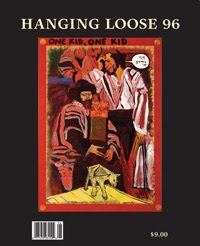
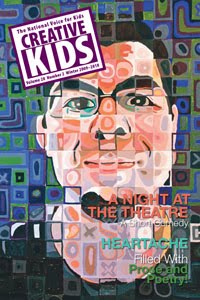 Special thanks to Creative Kids and to Hanging Loose for sending me copies to share with a group of gifted and talented students I taught last week in the workshop, “Publishing a Literary Magazine.” The magazines were great examples of the kinds of magazines young authors can find to read as well at to which they can submit their writing. The young readers/writers were thrilled to know that such publications “just for them” exist.
Special thanks to Creative Kids and to Hanging Loose for sending me copies to share with a group of gifted and talented students I taught last week in the workshop, “Publishing a Literary Magazine.” The magazines were great examples of the kinds of magazines young authors can find to read as well at to which they can submit their writing. The young readers/writers were thrilled to know that such publications “just for them” exist.
Spread the word!
Anthologize This!
Anthologize is a free, open-source, plugin that transforms WordPress 3.0 into a platform for publishing electronic texts. Grab posts from your WordPress blog, import feeds from external sites, or create new content directly within Anthologize. Then outline, order, and edit your work, crafting it into a single volume for export in several formats, including—in this release—PDF, ePUB, TEI. Anthologize is a project of One Week/One Tool, a project of the Center for History and New Media, George Mason University. Funding provided by the National Endowment for the Humanities.
This page of ‘case uses’ includes a list of suggested uses for Anthologize, including turning class blogs into an anthology at the end of the semeter or school year.
Spread the word!
What is Christian Publishing?
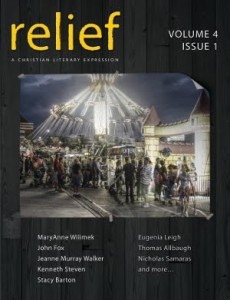 In Relief‘s current issue (V4 I1), Christopher Fisher debuts his first issue as editor by taking on where Relief – a journal of Christian literary expression – “fits in the scheme of contemporary publishing.” And, he writes, “I think of singing and razor wire.” Fisher discusses what Christian publishing has become, and how he recognizes the purely business aspect of the demarcation of what is Christian publishing, but also the perils of such segregation, the “ghettoization of religion.” His editorial, available in full online, is an insightful and provacative commentary on the subject matter. If you’ve been dismissive of “Christian” or religious lit mags in this past, this may well get you to reconsider.
In Relief‘s current issue (V4 I1), Christopher Fisher debuts his first issue as editor by taking on where Relief – a journal of Christian literary expression – “fits in the scheme of contemporary publishing.” And, he writes, “I think of singing and razor wire.” Fisher discusses what Christian publishing has become, and how he recognizes the purely business aspect of the demarcation of what is Christian publishing, but also the perils of such segregation, the “ghettoization of religion.” His editorial, available in full online, is an insightful and provacative commentary on the subject matter. If you’ve been dismissive of “Christian” or religious lit mags in this past, this may well get you to reconsider.
Spread the word!
Two Years of The Write Place at the Write Time
Celebrating its second year of publication, The Write Place At the Write Time is an online literary publication which features fiction, poetry, “Our Stories” – non-fiction, a Writers’ Craft Box of writing essays and resources from professionals in the field, an Exploration of Theme page, Archives of past issues, A Writers’ Contest, fine artwork from artists whose backgrounds include having done work for The New York Times,
Editor-in-Chief Nicole M. Bouchard writes: “Our two-year anniversary issue is up and we encourage new and seasoned writers to send in submissions for the next issue, benefit from resources we provide, read the current issue and enjoy themselves. It’s a supportive writers’ environment dedicated to artistic expression, learning and living the written word. We are a quarterly publication and our writers range from previously unpublished to having written for The New York Times, Newsweek, HBO and Business Week, and they come from all over the US and Europe.”
Spread the word!
New Lit on the Block :: Sliver of Stone
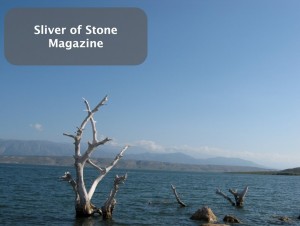 Under the guidance of Founding Editor M.J. Fievre, Sliver of Stone is a bi-annual, online literary magazine dedicated to the publication of work from both emerging and established poets, writers, and visual artists from all parts of the globe. Other hands on deck for Sliver of Stone, “the talented progeny of the Creative Writing Program at Florida International University in Miami, Florida” include: Corey Ginsberg,nonfiction editor; Fabienne S. Josaphat, fiction editor; Marina Pruna, Laura Richardson, Patricia Warman, poetry editors; Holly Mayes, art editor; and Abigail Sedaris, webmaster.
Under the guidance of Founding Editor M.J. Fievre, Sliver of Stone is a bi-annual, online literary magazine dedicated to the publication of work from both emerging and established poets, writers, and visual artists from all parts of the globe. Other hands on deck for Sliver of Stone, “the talented progeny of the Creative Writing Program at Florida International University in Miami, Florida” include: Corey Ginsberg,nonfiction editor; Fabienne S. Josaphat, fiction editor; Marina Pruna, Laura Richardson, Patricia Warman, poetry editors; Holly Mayes, art editor; and Abigail Sedaris, webmaster.
Issue One contributors include: Alan Britt, Alex Alderete, Andrea Askowitz, Andrew Abbott, Changming Yuan, Chloe Nimue Clark, Denise Duhamel , Ernest Williamson III, Gabriela Suarez, Jennifer Hearn, Jessica Barrog, Joe Clifford, John Dufresne, John Riley, John Solensten, Jon Page, Jonathan P. Escoffery, Julia Meylor Simpson, Kim Barnes, Laura Merleau, Mary Christine Delea, Nicholas Garnett, Peter Borrebach, Rae Spencer, Robert E. Wood, Roxanne Hoffman, Russ Hicks, Russell Reece, Samantha Knapp, Sherry O’Keefe , T.J. Beitelman, Terry Sanville, Tim Curtis, Whitney Scott, and Yia Lee.
Sliver of Stone accepts fiction, creative nonfiction, essays (3,500 words or less); poetry, any form or genre (No more than 5 poems); and visual art. The deadline for the next issue is October 31.
Spread the word!
Prism Queer Comics Grant
Every year, Prism awards a significant Queer Press Grant to assist in the publication and promotion of LGBT comics. The grant is funded by donors who are either creators who want to help others just starting out, or fans who want to see more LGBT creators get published. The grant of approximately $2,000 will be awarded to an LGBT cartoonist who is self-publishing a comic book with queer characters and/or themes. Entries are judged first and foremost by artistic merit, followed by concerns such as financial need, proposal presentation, and contribution to the LGBT community. Deadline September 15, 2010.
Spread the word!
Happy Birthday Old Dutch Church
The Old Dutch Church from Washington Irvings’s The Legend of Sleepy Hollow is 325 years old and ready for iPad tours.
Spread the word!
Sycamore Review Online Submissions
Beginning with its new reading period beginning August 1, Sycamore Review will be accepting submissions of poetry, fiction, and personal essays through their online submissions manager. They will no longer accept submissions via traditional post after August 1, 2010. Submissions for their 2010 Wabash Prize in Poetry judged by Jane Hirshfield, however, will continue to be accepted via traditional post.
Spread the word!
Kafka-something-or-other
“Lost Kafka writings have resurfaced, but the legal bureaucracy (legendarily immune to irony) is preventing their publication. There really ought to be some word for things like this.” Gerry Canavan
Spread the word!
Stunning Covers :: Main Street Rag
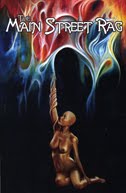 Evolution by Kathy Blackwell
Evolution by Kathy Blackwell
Spread the word!
Novel Excerpt :: Leora Skolkin-Smith
In “The Fragile Mistress,” it’s the summer of 1963 on the Israeli-Jordanian border. A fourteen-year-old American girl is believed to be to be dead, killed by a sniper. The Fragile Mistress is a unpublished excerpt from the novel, Edges, by Leora Skolkin-Smith. The novel, originally published by Grace Paley in 2005, has since been re-titled and expanded for the feature film, The Fragile Mistress, currently in pre-production with Triboro Pictures. It will be shot on location in Jerusalem, Jordan, and New York, and directed by Michael Gunther. Read the excerpt in the latest issue of Guernica, online.
Spread the word!
Books :: Teaching Poetry
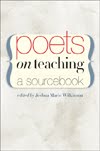 Poets on Teaching: “In response to a lack of source works for wide-ranging approaches to teaching poetry, award-winning poet Joshua Marie Wilkinson has gathered ninety-nine micro-essays for poets, critics, and scholars who teach and for students who wish to learn about the many ways poets think about how a poem comes alive from within—and beyond—a classroom. Not narrowly concerned with how to read poetry or how to write poetry, by virtue of their central concern with teaching poetry, the essays in this fresh and innovative volume address both reading and writing and give teachers and students useful tools for the classroom and beyond.” [University of Iowa Press / 1-58729-904-6 or 978-1-58729-904-9]
Poets on Teaching: “In response to a lack of source works for wide-ranging approaches to teaching poetry, award-winning poet Joshua Marie Wilkinson has gathered ninety-nine micro-essays for poets, critics, and scholars who teach and for students who wish to learn about the many ways poets think about how a poem comes alive from within—and beyond—a classroom. Not narrowly concerned with how to read poetry or how to write poetry, by virtue of their central concern with teaching poetry, the essays in this fresh and innovative volume address both reading and writing and give teachers and students useful tools for the classroom and beyond.” [University of Iowa Press / 1-58729-904-6 or 978-1-58729-904-9]
Spread the word!
The Un-Mississippi Review
What the heck is going on at Mississippi Review? Anna Leigh Clark does a nice job of summing it all up on her blog, Isak: Barthelme Departs, Mississippi Review and Center for Writers in Confusion. As for Barthelme, he and several of his fellow publication staffers carry on at Rick Magazine – which will continue to link to the Mississippi Review Online archives from their site.
Spread the word!
Work for Guernica
Guernica, an online magazine of arts and politics, has several different opportunities available: Special Events Coordinator, Accountant, Blog Intern, Publishing Intern, Editorial Interns.
Spread the word!
Online Post Graduate Fiction Workshops
Shannon Cain (Tupelo Press, recipient of the Pushcart Prize, the O. Henry Prize, and a fellowship from the National Endowment for the Arts) will be leading online post-graduate workshops in fiction along with guest authors/co-leaders Robin Black, Laura van den Berg, and Josh Weil. Workshops are six weeks in length, non-synchronous, and organized in a bulletin board format. (You can browe a sample workshop on the website.) Each week, three participants post their stories for review and commentary by Shannon and the group. In the final half of the workshop, particpants will be joined by a guest co-leader. Each participant will have the opportunity to have one story or chapter workshopped by the guest leader. Workshop size is limited to nine participants.
Spread the word!
On Blurbology
“So when publishing people look at the lineup of testimonials on the back of a new hardcover, they don’t see hints as to what the book they’re holding might be like. Instead, they see evidence of who the author knows, the influence of his or her agent, and which MFA program in creative writing he or she attended. In other words, blurbs are a product of all the stuff people claim to hate about publishing: its cliquishness and insularity . . . It stands to reason that, if many blurbs are bestowed for extraliterary reasons like friendship or professional collegiality, then many of them are insincere.” Laura Miller, Beware of Blurbs, Salon.com
Spread the word!
Audio :: Les & Bi Women’s Erotic Fiction
Newly added to the NewPages Guide to Podcasts, Video, Audio: The BlogTalkRadio program Readings in Les and Bi Women’s Erotic Fiction hosted Lara Zielinsky, a bisexual author of mature adult content lesbian and bi-women’s fiction, romance and erotica. Every other week she shares excerpts and interviews with authors and others involved in the writing and publication of lesbian and bisexual women’s fiction.
Check out the NewPages Guide to Podcasts, Video, Audio for this and many other great literary resources. Know of a one we should consider listing? Drop me a line: denisehill[at]newpages[dot]com
Spread the word!
A Word a Day
Founded in 1994 by Anu Garg, while a graduate student in computer science, A.Word.A.Day (AWAD) is a daily electronic publication from the wordserver at Wordsmith.Org. AWAD includes a vocabulary word, its definition, pronunciation information with audio clip, etymology, usage example, quotation, and other interesting tidbits about words to subscribers every day. You can think of it as a word trek where we explore strange new words. Words are usually selected around a theme every week. At last check, more than 900,000 people in at least 200 countries receive AWAD daily. There is no charge to sign up for AWAD.
Spread the word!
Glimmer Train Short Story Award for New Writers :: August 2010
Glimmer Train has just chosen the winning stories for their Short Story Award for New Writers. This competition is held quarterly and is open to all writers whose fiction has not appeared in a print publication with a circulation greater than 5000. The next Short Story Award competition will take place in August. Glimmer Train’s monthly submission calendar may be viewed here.
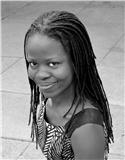 First place: Olufunke Grace Bankole, of El Cerrito, CA, wins $1200 for “26 Bones.” Her story will be published in the Fall 2011 issue of Glimmer Train Stories. [Photo credit: Cheryl Mazak.]
First place: Olufunke Grace Bankole, of El Cerrito, CA, wins $1200 for “26 Bones.” Her story will be published in the Fall 2011 issue of Glimmer Train Stories. [Photo credit: Cheryl Mazak.]
Second place: Joseph Vastano, of Austin, TX, wins $500 for “Entirely Different Places.”
Third place: Natalia Cortes Chaffin of Las Vegas, NV, wins $300 for “The Pig Roast.”
A PDF of the Top 25 winners can be found here.
Spread the word!
Why Teach Multicultural Literature?
Multicultural Literature: Literature Changes Lives by Dr. Darrel Hoagland, a former elementary and middle school teacher who lives in New Bedford, MA and Philadelphia, PA. (from the Changing Lives Through Literature blog)
Spread the word!
Vanishing Point
Vanishing Point is not a memoir. It says so in the bottom right corner on the cover. On the back of the book, it says “Literature/Essays.” In this book, Ander Monson serves on a jury, spends time at Panera Bread, details his self-Googling results, and devotes a section to the flavors of Doritos. But Vanishing Point is about all of us. How the I of my life, of your life, of every life, blends together and vanishes, at least a little. Continue reading “Vanishing Point”
Spread the word!
Black Box Theater as Abandoned Zoo
Winner of the 2008 Concrete Wolf Chapbook Competition, Dana Elkun’s Black Box Theater as Abandoned Zoo offers a guided tour of a rich, imagined landscape. The cover of the volume features a pair of monkeys, perched on a bed, releasing butterfly silhouettes into the air. Underneath the enigmatic cover art, 15 sophisticated yet accessible poems treat topics as varied as marriage, medicine, and history. Continue reading “Black Box Theater as Abandoned Zoo”
Spread the word!
How to Catch a Falling Knife
The greatest strength in How to Catch a Falling Knife, Daniel Johnson’s first collection of poems, is its chosen silences. While that may sound like strange praise, this book’s sparseness gives it a paradoxical power where the poet’s ability to know what not to say and when allows what he does say to starkly shine in the same way that it is more arresting to see one light left on in a house you gaze at from the dark street than it is when all the windows are festively blazing. Continue reading “How to Catch a Falling Knife”
Spread the word!
The Evolutionary Revolution
The latest release from Lily Hoang, The Evolutionary Revolution is a history unto itself. Both a fable and a myth (“Myth is about the past, fable is about the future.”), this title revolves around stories of an ancient, watery Earth populated by “subspecies,” one of which is man, although she does not physically resemble modern homo sapiens. (I know I’ve used “man” and “she” together. It’s an oft-employed technique from the book, one of many contradictions of language that whirl about and simply shrug off their own existences, adding to the intricate mystery and progression of Hoang’s work.) Continue reading “The Evolutionary Revolution”
Spread the word!
The Logic of the World
Entering my neighborhood from a different direction for the first time, I became disoriented, unable to find my building right away. Then, there it was! And I suddenly had a new "feel" for the place. Experiencing the familiar from a new perspective can bring disorientation that, fading, leaves an enhanced understanding. In much the same way, Robert Kelly's fiction shows us our familiar world from a new perspective, and expands our understanding of this life we live. Continue reading “The Logic of the World”
Spread the word!
Tea Time with Terrorists
I recently became aware of the term personal watermelon. This is a smaller melon than your picnic-for-ten variety, weighing in at 5 lbs or less. Briefly, I entertained the false notion that the term meant the sweet, quenching fruit was mine mine mine and no one’s but. “Personal Watermelons. Get them here.” I’ve been reading about the seedless orbs a lot lately. They seem to be in season; it’s their time. Much like terrorism and terrorist were – and continue to be – ripe terms following September 11, 2001. On that date, artist, software designer, and global hitchhiker Mark Stephen Meadows found himself stranded in Paris, unable to fly home to California as planned on September 12. Continue reading “Tea Time with Terrorists”
Spread the word!
The Relenting
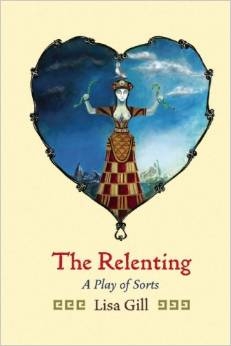 Not every writer could make a face-down with a rattlesnake in her Moriarty living room “a primal encounter waiting to be interpreted,” yet that’s precisely what Albuquerque poet Lisa Gill has done. Her introduction to the play, “The Catalyst & the Evolution,” contains one of the best descriptions of the writing process I’ve read: “Ecdysis is the word for the skin sloughing snakes do and might as well be the word for the process writers go through with revisions of certain manuscripts, those texts whose life cycles demand we shed draft after draft, abandoning each accrued preconception to ultimately access deeper instinct.” Continue reading “The Relenting”
Not every writer could make a face-down with a rattlesnake in her Moriarty living room “a primal encounter waiting to be interpreted,” yet that’s precisely what Albuquerque poet Lisa Gill has done. Her introduction to the play, “The Catalyst & the Evolution,” contains one of the best descriptions of the writing process I’ve read: “Ecdysis is the word for the skin sloughing snakes do and might as well be the word for the process writers go through with revisions of certain manuscripts, those texts whose life cycles demand we shed draft after draft, abandoning each accrued preconception to ultimately access deeper instinct.” Continue reading “The Relenting”
Spread the word!
Under the Small Lights
John Cotter, author of the just published novella Under the Small Lights, is also a poet. The novella, a co-winner of 2009 Miami University Press Novella Contest, and a knowing yet earnest coming-of-age story about a group of college-age youths embracing a guileless hedonism and salvation through art, has many marks of a poet: a deft feel for spoken language and the ability to create vivid scenes through language. The very structure of the book – with short, often very short, chapters – has less of the expansiveness of prose, and more the concise cognitive breath of poetry. Continue reading “Under the Small Lights”
Spread the word!
Falling off the Bicycle Forever
The latest collection from Michael Rattee, Falling off the Bicycle Forever, is a smooth, two-wheel ride through your nearest suburban neighborhood; if you don’t pay close enough attention, you’ll miss the subtleties of this book’s sedentary life, the thick underlay of muck beneath the gilded exterior of the American Dream. Continue reading “Falling off the Bicycle Forever”
Spread the word!
Destruction Myth
Mathias Svalina’s Destruction Myth is a collection of great intellectual rigor, grounded by an awareness of the everyday. It presents a series of forty-four poems, all but one entitled “Creation Myth.” Reaching back into history – and sometimes prehistory – Svalina’s poems explore origins. Indeed, almost every work but the last (“Destruction Myth”) starts with some variation of “In the beginning.” Relying upon this formula lifted from “Genesis,” Svalina nonetheless demonstrates great range. He presents highly personal material, confessing “how I felt / when I was eight years old / & my home broke apart,” alongside thought-provoking anthropological generalizations (“Human life begins / at the moment / of contraception”; “Nothing without thumbs / is human”). And he displays skill with both free verse and prose – though the latter mode seems better suited for his forthright tone and frequent use of dialogue. Continue reading “Destruction Myth”
Spread the word!
I Have to Go Back to 1994 and Kill a Girl
When titles are well written, they strike our interest and pull us into the main text, but they also are part of the main text – adding to the story, the voice, the emotional resonance – and should never be something without which a text can survive or make sense. I Have to Go Back to 1994 and Kill a Girl – chosen by Lynn Emanuel for the 2008 Kathryn A. Morton Prize in Poetry – does just those things and is exactly what the title of a book should be; even before readers get to what’s inside of the book, it is striking, creative, intriguing, and relevant. Continue reading “I Have to Go Back to 1994 and Kill a Girl”
Spread the word!
Requiem for the Orchard
What’s in an author’s name? Just uttering, “Oliver de la Paz” is to be moved by poetry. Repeating the musicality of such a name over and over before even peeling back the cover to the opening poem makes one ponder, “Could this poet’s name be some sort of predestination statement at the root of his creative process? Or evidence of his introduction since birth to the rise and fall of words that have fine-tuned his ear?” Continue reading “Requiem for the Orchard”
Spread the word!
Creating a Life
In her memoir Creating a Life, Corbin Lewars chronicles her difficult journey to motherhood. Along the road there is a miscarriage, unearthed memories of being raped as a teenager, a struggle to find meaningful work, and tough decisions about the birth itself: hospital or home? Drugs or “natural” childbirth? Continue reading “Creating a Life”
Spread the word!
The Disappeared
The novel The Disappeared, by Kim Echlin, is one that defines how love can surpass not only generations but countries as well. The story comes through so naturally – the narrator not hesitating to let true statements of the heart come through when need be – that, by the end of the novel, I felt as if this was a story told to me personally by a good friend. Continue reading “The Disappeared”
Spread the word!
2010 New Millennium Contest Winners
New Millennium Writings has announced the winners of their 2010 poetry, fiction, short-short fiction and nonfiction contest as:
Pamela Uschuk of Bayfield, Co, has captured the $1,000 Poetry Award for her poem, “Shostakovich: Five Pieces.”
BK Loren of Lafayette, Co, took the $1,000 Fiction Prize for her story “Cerberus Sleeps.”
Norma Shainin of Mt. Vernon, Washington, was awarded the $1,000 Short-Short Fiction Prize for her story “The Famous Writer.”
Amy Andrews of Rochester, NY, earned the $1,000 Nonfiction Prize with her creative nonfiction essay, “hide and seek.”
Their works are scheduled to appear in the next issue of NMW, due out this winter, and also at www.newmillenniumwritings.com.
Spread the word!
Books :: Writing and Publishing
 Carol Smallwood has been quietly creating a name for herself over the years, and I say quietly for a couple of reasons. First, she’s a librarian! With both an MLS and an MA, she has focused her writing on resources for librarians. But I also say quietly because she has edited a couple of phenom publications, taking the back seat to the subject matter, as great editors do. Her latest collection is one not to be missed by any writer who is interested in learning more about publishing venues. That’s right: I said Writer. Not just Librarians.
Carol Smallwood has been quietly creating a name for herself over the years, and I say quietly for a couple of reasons. First, she’s a librarian! With both an MLS and an MA, she has focused her writing on resources for librarians. But I also say quietly because she has edited a couple of phenom publications, taking the back seat to the subject matter, as great editors do. Her latest collection is one not to be missed by any writer who is interested in learning more about publishing venues. That’s right: I said Writer. Not just Librarians.
The book is Writing and Publishing: The Librarian’s Handbook (ALA Editions 2010), but any non-librarian writer who passes this book by because of that subtitle is making a huge mistake. This book is chock full of some of the most practical, hands-on, I’ve-lived-this advice from writers about the most wide array of publishing venues I have ever read in a single collection. There are 46 contributors to this collection, condensed into less than 200 pages. This is my kind of “guide” – it gets directly to the nitty-gritty of each individual topic in 92 (yes, you read me right) essays.
Granted, some of the topics covered are Librarian-specific, such as “MLS, MFA: The Working Librarian Pursuing a Degree in Creative Writing” (Colleen S. Harris), “Partners: Helping Your Hometown Paper Promote the Local Library” (Beth Nieman), and “Children’s Librarians! Use Your Skills to Fill Your Collection Gaps” (Margaret Read MacDonald). Although, I did find the information insightful and even helpful as someone who works closely with librarians to help promote events, build collections, etc. But there are plenty more contributions that seem library-specific, like “Blogging: Writing Op-Eds” (Michale Dudley) and “The Poet-Librarian: Writing and Submitting Your Work” (Colleen S. Harris) that make consideration for the role/career of librarian, but could just as easily be applicable to anyone with any other career. Specifically for librarians, however, is insight in how to participate in these publishing venues either as part of the job to help promote the library/collections, or as a separate activity and the politics of keeping your writing life clear from that of public or institutional jobs and the overreaching restrictions those sometimes have.
The breadth of topics in this collection is most astounding. It’s not just a something-for-everyone collection, it’s an a-lot-for-anyone collection. For librarians who want to do ANY kind of writing, this book is a no-brainer to get, read, and keep in your personal resource library. For others – anyone interested in writing to publish, this is a resource to take a look at. There are plenty of other “publishing” resources out there – but in my recent research for a college-level course in professional writing, finding a book as comprehensive in voices and topics as this one is RARE. I wouldn’t pass up using this as a resource with students interested in publishing. For students? Heck, for anyone trying to step into and make sense of where to get started or different directions to take in publishing.
Here’s just an outline of the content:
Part 1 – Why Write
Part 2 – Education of a Writer
Getting Started
Writing with Others
Revise, Revise, Revise
Lessons From Publishing
Part 3 – Finding Your Niche in Print
Books
Newsletters and Newspapers
Reviewing
Magazines and Professional Journals
Essays
Textbook Writing
Children’s Literature
Writing on Specific Subjects
Part 4 Finding Your Niche Online
Part 5 Maximizing Opportunities
For a more detailed outline of content, visit the publisher’s website: Writing and Publishing
Spread the word!
Telling the Story Behind Storytelling Totem Poles
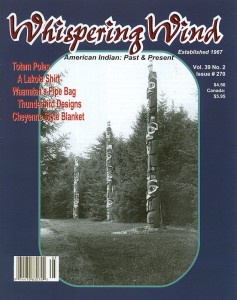 The current issue of Whispering Wind (V39 N2 I271) features the article “Totems at Sitka National Historical Park Sitka, Alaska” by Scott Jensen that is worth seeking out to read and share with others. This is a thorough exploration of the history of the totem pole in the Northwest Territory, and includes numerous, clearly referenced photos. Jensen’s writing is well researched and documented and provides a solid historical understanding of the role of the totem pole in Native American storytelling.
The current issue of Whispering Wind (V39 N2 I271) features the article “Totems at Sitka National Historical Park Sitka, Alaska” by Scott Jensen that is worth seeking out to read and share with others. This is a thorough exploration of the history of the totem pole in the Northwest Territory, and includes numerous, clearly referenced photos. Jensen’s writing is well researched and documented and provides a solid historical understanding of the role of the totem pole in Native American storytelling.
Spread the word!
Five Points – 2010
Edited by Megan Sexton and David Bottoms, this issue of Five Points explores literature as well as audio inspired by the theme “Belfast Imagined.” Work includes an interview with novelist Glen Patterson (which is also available on the journal’s website); photography comprising a series entitled “Flash Points”; a companion 19-track, 78+ minute CD; two essays; fiction; and poetry by Medbh McGuckian, Ciarán Carson, Leontia Flynn, Howard Wright, and Alan Gillis, whose poem “Down Through the Dark and Emptying Streets” begins the issue: Continue reading “Five Points – 2010”
Spread the word!
Hayden’s Ferry Review – Spring/Summer 2010
I’m warning you from the get-go: I will never be able to do this volume justice in a one itty-bitty little review. This is one big, bold, brilliant effort. From Brian Dettmer’s “New Books of Knowledge,” full bleed front and back cover art, to Halina Duraj’s essay, “The Company She Keeps,” the last piece in the magazine, this is surely one of Hayden’s Ferry Review’s most exciting issues ever. Continue reading “Hayden’s Ferry Review – Spring/Summer 2010”
Spread the word!
The Iowa Review – Spring 2010
A terrific redesign to kick off the journal’s 40th year. I love the new look and feel (decidedly less stodgy; easier to hold and read; appealing new shape, beautiful cover and page layouts). Prose – seven stories and five essays – is what held my attention most vividly in this volume, beginning with Elizabeth Benjamin’s beautifully composed prose in “Scarce Lit Sea” (“A year after he said see you soon out the window of his truck, he returned to me, in the night as he had always come, either by water, his boat striking the sharp brown rocks, or on foot, whistling bird calls from the trail.”). Stories by Karl Harshbarger, Whitney Ray, Sarah Colvert, Amma Gautier, Ben Fountain, and Kirsten Clodfelter couldn’t be more different from Benjamin’s, or from each other, but all are solid and satisfying in different ways and for different reasons, making the short fiction in this issue especially appealing. Continue reading “The Iowa Review – Spring 2010”
Spread the word!
The MacGuffin – Spring/Summer 2010
Curiosity got the better of me. Once I’d read the title, “Je Suis un Ananas” (I am a Pineapple) in the TOC, I had to turn to Libby Cudmore’s essay right away. I got doubly rewarded for my impatience. First, with Cudmore’s short, insightful response to “new media” (YouTube, Facebook) efforts to encourage a revisionist approach to childhood memories; and then by Colleen Pilgrim’s exquisite black and white photo, “Bog Trail,” which I had not expected on the facing page. The quality of Pilgrim’s photo sent me straight back to the TOC to look for other photos, and I was happy to find another of Pilgrim’s photo, and stunning images by Patrick Mog and Robert McGovern. Continue reading “The MacGuffin – Spring/Summer 2010”
Spread the word!
Northwest Review – 2010
In this era of short attention spans, multi-tasking, split screen viewing, fast food, speed dial, and the quick fix, I admire Northwest Review’s daring: this issue features three very long short stories (Charlie Smith’s “We’re Passing Through a Paradise” is nearly 50 pages) and a lengthy essay by poet Eavan Boland (just under 20 pages). The work of 15 poets rounds out the issue. Continue reading “Northwest Review – 2010”
Spread the word!
Oxford American – 2010
A glossy, four-color magazine produced quarterly in Arkansas, featuring magazine journalism, fiction, a dining column, news of the south, and the annual “Best of the South” selection. This year’s “Best of the South” turns “best-of” lists upside down with quirky “Odes to” places, trips, events, people, experiences, books, activities, nature highlights, sports, commercial establishments, food and drink, the visual arts, famous personalities, moods and moments by writers, artists, and actress Sharon Stone. Beth Ann Fennelly expounds on “Ten Sexy Books” (writers as distinctly different from each other as Tennessee Williams, Zora Neale Houston, and Ellen Gilchrist make the list). Maud Newton writes about the Biltmore Hotel in Florida. Barrah Hannah’s ode is advice to a young writer advising that he/she treasure loneliness. William Giraldi celebrates body builders in Louisiana. Continue reading “Oxford American – 2010”
Spread the word!
Poetica Magazine – Spring 2010
This is the “short story” issue, fifteen short works (2-4 pages) many of which read more like memoirs or personal essays than fiction, and they may be (genres are not identified). They are direct in their intention to be “reflections of Jewish thought.” Half have titles that announce their Jewish-ness in one way or another (“Post-Abrahamic,” “Tekiah Gedola: The Strongest Call,” “Mamala,” “Zaydie the Courageous,” “A True Hillel and Shamai Story,” “Yom Kippur,” “Israel Journey, ’94 Heart”), and all have overtly Jewish themes of one type or another: one’s relationship to Israel; the portrait of a grandparent as an example of Jewish life as it used to be; differences in Jewish practice or belief between parents and children; the experience of Holocaust Survivors; memories of synagogue services; relationships with Christian neighbors; coping with aging parents; the changing nature of Jewish families. Continue reading “Poetica Magazine – Spring 2010”
Spread the word!
Poet Lore – Spring/Summer 2010
This issue’s cover is a riveting photo of Japanese-Americans at a Los Angeles rail station on their way (forcibly) to internment camps in 1942. In fact, the photo is so beautifully composed and so striking, it’s hard to open the cover and leave it behind. But, it would be a shame not to, the issue’s simply terrific. “Poetry…survives war’s upheavals and seeks to leave an enduring record…rebuilding has always been part of poetry’s promises,” assert Poet Lore’s editors. Much of the work here certainly deserves to endure. Continue reading “Poet Lore – Spring/Summer 2010”
